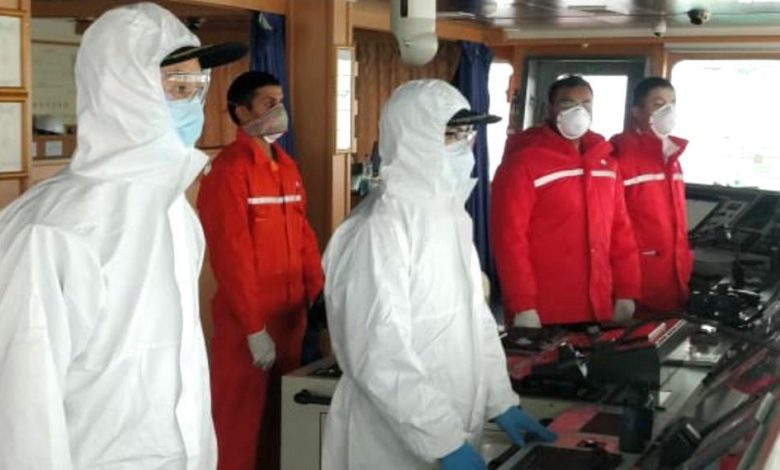Covid outbreaks at sea immobilising entire crews

New variants of Covid-19 are immobilising entire crews, creating further panic and mayhem at sea, and highlighting the urgent need to get a global seafarer vaccination programme in place.
Alice Amundsen, who heads up Gard’s global people claims area, has revealed in an update last week that the insurer had received a record number of Covid incident reports over the past month.
“For the first time, we see outbreaks on board infecting most of the crew, with the majority suffering symptoms, which can result in serious operational issues,” Amundsen stated in an interview carried on the Gard site.
Earlier on in the pandemic, ships typically had one seafarer testing positive for Covid-19, who was isolated onboard, unless they needed medical treatment.
Now the P&I Club is seeing entire ships placed in isolation because most of the crew are infected, likely from new variants of the coronavirus.
The global Covid-19 spotlight has turned to focus on the Indian variant of coronavirus in recent weeks. Named B.1.617, the variant has spread through much of India, and since spread to more than 50 countries. The Indian variant has shown considerably increased transmissibility in preliminary studies.
While earlier cases of a single seafarer becoming infected at sea and then isolated meant operations remained in control, the new strains being detected have the potential to wreak havoc on global supply chains, warned Captain Rajesh Unni, the founder and CEO of Synergy Marine, one of the world’s largest shipmanagers.
“Now we are seeing ships that are being isolated because several members of the crew, at times the majority of them, are infected because the rate of spread of the new variants is much larger. This leaves the ships affected, immobilised,” Unni relayed in conversation with Splash today.
Unni said his company had been pleading with authorities to allow them to land colleagues ashore for treatment.
“The response from most has been nothing short of inhumane,” Unni lamented.
Some ports are now asking for two negative PCR tests with a significant gap in between for all crew before getting clearance. In some cases this means ships are being immobilised for more than two weeks. Immobilised ships could hurt the stretched liner sector the most, Unni predicted, with shippers already struggling to source empty containers.
Captain Kuba Szymanski, secretary general of InterManager, the association for third party managers, said his team was monitoring the Covid numbers at sea carefully to see if any patterns emerge from the new strains of the virus. InterManager has detected increasing numbers of on-signers testing positive.
“On-signers not being able to join a ship is potentially a serious problem,” Szymanski told Splash.
InterManager will take another sample from its members next week to establish another data point to see the infection trends.
Frustrated with the lack of international coordination and progress to get seafarers jabbed with Covid-19 vaccines, InterManager has successfully negotiated with Johnson & Johnson and has secured an in-principle order for 1m one-shot Covid-19 vaccine doses for seafarers at a reduced rate.
Given the long periods at sea between port calls, shipping has been seeking one-dose Covid-19 solutions such as Johnson & Johnson’s.
Now, in order to place and receive the $22m order, InterManager needs to work with a recognised governmental body, in line with current international law.
InterManager is speaking with the UK and Cypriot governments and has others in line too, but so far its efforts have drawn a blank.

Dear Sam,
Thank you for publishing this article which serves as a warning to seafarers onboard vessels as well as to Owners and Managers.
Given the fact that seafarers onboard a ship can only contract Covid if a crew change is carried out whereby an onsigner/s may bring the virus onboard irrespective of going through RT PCR testing prior boarding or by coming into contact with Port personnel, I strongly feel that urgent measures should be taken to ensure that joiners as well as port personnel are well screened prior to boarding vessels. At present every country from which seafarers can still join vessels place them through mandatory quarantine as well as a RT PCR test and as such the chances of an infected seafarer boarding a vessel is somewhat remote. However since Port personnel do not go through such a strict screening process on a daily basis after reporting to work from home, it is inevitable that they would become the main source of taking the virus onboard any ship that calls at a port.
Recently there has been quite a few cases of infected seafarers found onboard ships which had called at Indian ports and it is expected that many will follow until India is able to bring the current wave of Covid under control. The double and triple mutant strains of the virus which is in India has and will continue to lead to fatalities onboard ships.
Considering that seafarers should be protected due to the limited medical facilities onboard ships it is prudent to focus attention on Port personnel boarding ships and introducing practical yet effective procedures for them to be screened for Covid prior boarding a vessel. This would serve as a much effective deterrent towards keeping the virus away from seafarers.
A campaign should be launched by Ports under the slogan ” Lets keep our seafarers onboard ships safe from Covid”.